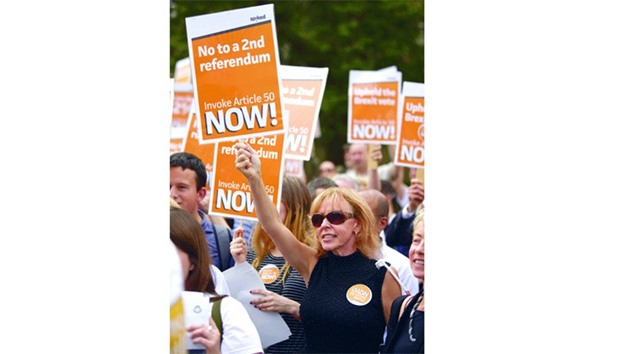Downing Street has ruled out a points-based immigration system promised by the official Brexit campaign but insisted Theresa May would put forward a better way of controlling arrivals to the UK.
The prime minister was accused of backsliding on promises made by the Vote Leave campaign, after she cast doubt on the effectiveness of a system admitting people on the basis of their skills and refused to commit an extra £100mn to the NHS.
As former Ukip leader Nigel Farage suggested yesterday she was betraying Brexit voters, No 10 issued a statement saying it would devise an immigration system that gave the government more control than a points-based system.
A spokeswoman said: “One of the opportunities of Brexit is that we will be able to control the number of people coming to Britain from the EU. The precise way in which the government will control the movement of EU nationals to Britain after Brexit is yet to be determined. However, as the premier has said many times in the past, a points-based system will not work and is not an option.
“When Labour introduced a points-based immigration system, the numbers went straight up. In Australia, they have a points-based system, and they have higher immigration per capita than Britain. A points-based system would give foreign nationals the right to come to Britain if they meet certain criteria: an immigration system that works for Britain would ensure that the right to decide who comes to the country resides with the government.”
A points-based system of immigration applying to migrants from across the world was first suggested by Ukip and quickly championed by the Leave campaign spearheaded by May’s Foreign Secretary, Boris Johnson.
It would have seen equal access to the UK for citizens from across the globe based on certain criteria such as skills and qualifications, without giving any special access to those from the EU.
Farage said: “May’s track record on immigration as home secretary was appalling and her comments rejecting an Australian-style points system really worry me.
“There is already huge anxiety out there in the country regarding May’s reluctance to trigger Article 50. Her rejection of the type of migration system so many went out there and voted leave to see implemented indicates serious backsliding.”
Remain campaigners also seized on May’s comments as a sign that people who voted for Brexit had been misled.
Chuka Umunna, the Labour MP and chairman of the campaign group Vote Leave Watch, said: “Johnson and his Vote Leave colleagues spent the whole referendum campaign making impossible promises they knew they couldn’t keep. It’s now clear that very few of their pledges were worth the paper they were written on.”
“May cannot be let off the hook either. After barely campaigning for Remain, our unelected prime minister now contemptuously dismisses policies like increasing spending on the NHS which people voted on in good faith and great numbers.”
No 10 sources insisted May was still intending to honour the essence of what people voted for by bringing in a system that will be more effective at curbing immigration than the Vote Leave and Ukip idea.
Theoretically, this could include a work permit or visa system, restrictions on entry to those with job offers, a quota system or an emergency brake.
However, the prime minister has given no more details about how this might be done and has not answered the crucial question of whether the government could give preferential access to citizens of the EU over those from the rest of the world.
The dilemma for May is that a number of EU states have indicated the UK will not get preferential terms for trading without accepting at least a degree of free movement for EU citizens.
Carlo Calenda, an Italian economic development minister, told Bloomberg: “We cannot waste two years by negotiating with the UK how to maintain them inside without them wanting to be inside. We cannot afford this paradox … The more they are going to regulate and limit the presence of EU citizens in the UK, the more we are going to limit the presence of UK goods into Europe.”

Pro-Brexit demonstrators, calling on the government to invoke Article 50 immediately, and urging them not to hold a second referendum, shout slogans and hold placards as they protest outside the Houses of Parliament in London yesterday.
